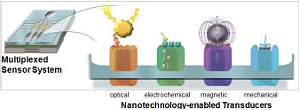
The Nanotechnology Signature Initiative (NSI), Nanotechnology for Sensors and Sensors for Nanotechnology: Improving and Protecting Health, Safety, and the Environment, the fifth NSI to be launched by agencies of the National Nanotechnology Initiative (NNI), has extended of a request for information on the topic. Sensors incorporating nanostructures and nanomaterials have been under development for over 20 years now, and show the potential to provide significant societal impact through the deployment of inexpensive, simple to use, portable devices that can rapidly detect, identify, and quantify biological and chemical substances. Such sensors would ultimately impact consumer and military applications including medicine and healthcare, biological and chemical warfare threat detection, environmental monitoring, pharmaceuticals, food, and agriculture.
The Nanosensors NSI focuses on two aspects of sensor technology; the opportunity of using nanotechnology to advance sensor development, as well as the challenges of developing sensors to keep pace with the increasingly widespread use of engineered nanomaterials (ENM). This signature initiative builds upon the efforts of numerous NNI member agencies to support research on nanomaterial properties and development of supporting technologies that enable next-generation sensing of biological, chemical, and nanoscale materials. This interagency effort coordinates and stimulates creation of the knowledge, tools, and methods necessary to develop and test nanosensors and to track the fate of engineered nanomaterials in the body, consumer products, the workplace, and the environment.
The NSI coordinates existing and emerging efforts to explore the use of nanotechnology in two thrust areas:
- Develop and promote adoption of new technologies that employ nanoscale materials and features and the size dependent properties of engineered nanomaterials to overcome technical barriers associated with conventional sensors, focusing on three goals;
- Support research on nanomaterials and nanoscale device components to enable the next generation of sensors, including tunable, label-free, and enzymatic sensors
- Support development of integrated and portable sensor devices, including information systems support for collection, analysis, and transfer of large amounts of sensor data
- Accelerate commercialization and expand the application base of existing nanosensor base
- Develop methods and devices to detect and identify engineered nanomaterials across their life-cycles in order to assess their potential impact on health, safety, and the environment, focusing on three goals:
- Identify and quantify unique magnetic, optical and electronic signatures of nanomaterials in specific matrices with minimal sample preparation
- Identify “surrogate” indicators of nanomaterial presence
- Design and develop “tags” for nanomaterials that will enable their detection and measurement if released into the environment
The Office of Science and Technology Policy (OSTP) and National Nanotechnology Coordination Office (NNCO) have published a request for information (RFI) from the general public regarding the NSI. Responses are solicited in general areas including standards, testing, manufacturing, commercialization, and regulation. The NNN encourage stakeholders in nanotechnology and nanomanufacturing to respond to the RFI. More information and details can be found at nano.gov.
References: Request for Information: NNI Nanotechnology for Sensors and Sensors for Nanotechnology Signature Initiative
